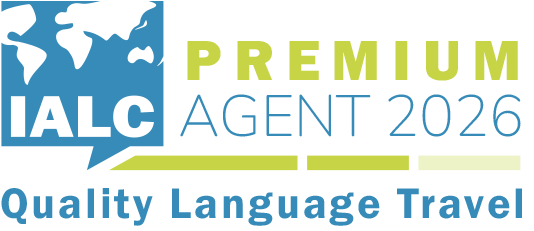Tarifa Spanish Teenager course FAQs
If you’re looking for a Spanish course for 14/17 yr old students, Tarifa is the perfect mix of summer sunshine, sociability and Spanish.
The school only caters for 60 students max in a session – and July is already over 50% full, so a quick decision is recommended.
You can view the course information on line: Spanish course for Teenagers in Tarifa
but below we’ve answered a range of questions that parents ask about the programme.
Feel free to contact us if you can think of a few more.

Do you pick up the pupils at the airport?
Yes, we pick them up at the airport Málaga when they arrive and bring them safely to the bilingual summer camp in Tarifa.
There is no one fixed leaving hour in Málaga, for Tarifa. Preferred arrival is always for around 12noon but the school can also pick up students who arrive later. In summer there are always some delays in arrival so the school is ready for this when it happens. The last school staff do not leave the airport until the final student arrives. One of the group leaders will always wait for late arrivals and bring them by car to Tarifa. This is why it is very important to keep the school informed of any delays as early as possible on the day, so that they can build it into their planning.
There are always plenty of group leaders at the airport to supervise the new arrivals. The school aims to ensure no students wait too long at the airport before they are transfered to Tarifa.
Pick ups from other airports (Jerez de la Frontera or Sevilla) possible for an extra charge.
Return Transfer:
Returning to Malaga airport follows the same procedure. There is no fixed departure hour. The school will make up groups and organise several transport options so that everybody will be at Malaga airport in good time for their check in requirements. The school recommend parents book flight times for the return flights around 2 pm, but if this should not be possible other flight schedules are fine. Try not to make any departure from Malaga too early (remember we have to get them there in time for Check In – which can make for a very early start). The students are always in company of the Camp group leaders until they are formally checked in and going through Customs.
What about supervision?
The Campers are supervised around the clock and the pupils are not allowed to go out without counsellors at night. During the night the Tarifia School has a watchman on duty.
What qualifications do the teachers have?
All teachers at the School have university degrees in Spanish or English linguistics but we also value their human characteristics such as patience, sociability and humour.
How are the class levels arranged by language ability?
The Spanish courses are divided into four different language levels from A1 to B2 : absolute beginners, intermediate and advanced I and II and the English courses into three: Pre-Intermediate Intermediate and Advanced (A1 – B1).
All pupils with previous knowledge of Spanish or English are kindly asked to return the level test some weeks before the beginning of the programme. Should the level chosen not be appropriate the student can change to another class.
How many pupils are there in a course level?
The average number of pupils in one group is 7. The maximum is 12.
What countries are these participants from?
They come from all over the world (there are always at least 20 nationalities represented). The school also admit pupils from Spain (learning English). Generally there are 60 students in total on the programme, around 10 of whom are Spanish students learning English, the rest are students from other countries learning Spanish.
How many pupils sleep in one room?
The school residence offers rooms for a maximum of 3 pax. each. The distribution of rooms is organised on a “first come, first serve” basis. Girls and boys are accommodated on separate floors.
Can you provide a description of the School residence?
Only three minutes from the beach, the dormitories offer a hostel style environment with living quarters for girls and boys on separate floors.
At the student’s disposal are ping pong tables, a tabletop soccer, music- and television facilities and a big courtyard for outdoor games, such as football, basketball, etc. The multifunctional sport fields will certainly be the focus of many sporty challenges during the Summer School. The lounge area is the meeting point of the Campus. All activities start there and it’s the place where you will always find someone to talk to. For advice or personal support there is always someone in the office, which is located next to the lounge.
For phone calls, there are some phone booths near the school residence for international phone calls with phone cards for EUR. 5,–, which we sell at the Campus.
There is also a computer room at the disposal of our language students. Usage time of the computers will be restricted according to the requirements of the number of students using them.
For a friendly, relaxed and enjoyable stay we encourage you to bring your own musical instrument.
Also at the student’s disposal are miscellaneous games.
At a glance the Spanish/English language students can benefit from the following facilities in our school residence:
Dormitories
Office for personal attention of students
Outdoor sport installations
Lounge
Internet facilities
Ping pong tables
Tabletop soccer
Lockers for personal belongings
Dining room
Classrooms
What does our son / daughter need to bring?
Sports wear:
2 swim suits
1 beach towel
1 pair flip flops
1 pair gym shoes
1 pair good walking shoes
1 small backpack
1 cap or hat
Daily clothes:
shorts
pants
2 – 3 shirts
t-shirts
2 sweaters
1 raingear
2 pairs of comfortable shoes
underwear
pijamas/nightdress
Personal care:
2 large towels
1 small towel
1 pair of plastic shoes for the shower room
comb/hairbrush
tooth brush
tooth paste
razors, shaving foam, sanitary towels, tampax, etc.
deodorant
shower gel + shampoo
sun block
sun glasses
laundry bag
Documents:
passport
european health card
travel insurance with repatriation
+ personal clothes
+ any personal medicines
( if the student suffers from a chronic disease, allergies or other ailment that requires special medication, please let us know when enrolling)
Please mark clothes & towels with the student’s initials so that they can be recognized easily when coming back from the laundry.
Is any insurance included in the programme?
Accident and liability insurance is included but it is mandatory for all participants to have their own travel insurance which includes repatriation.
How can I sign up my son / daughter for the summer camp in Spain?
Please contact the CESA Languages Abroad office to apply:
www.cesalanguages.com
info@cesalanguages.com
01209 211800
+44 1209 211800
Is the plane ticket included in the price?
The price does not include the airplane ticket. Please book a flight for your son / daughter to Málaga. For an extra charge we also pick up in Jerez de la Frontera or Sevilla or bring pupils back.
What if we have additional questions?
You can contact the CESA office. Our phone number is +44 1209 211800 or 01209 211800 in the UK. Or you can send us an e-mail : info@cesalanguages.com.
Does it rain during summer?
It is very uncommon to have rain in the summer, but if it does rain it is only for a few hours.
What about laundry?
The clothes are gathered and washed every day for a different group. The clean clothes will be returned the same day in the evening or early the next morning. We ask all parents to mark the clothes as well as the towels with the pupil’s initials so that they can be recognized easily when coming back from the laundry.
What type of electrical plugs and what voltage do you have?
In Europe we have two prong round plugs and 220 voltage. Should you have 110 voltage you would need a converter from 110V to 220 voltage.
How do you organise the sleeping arrangements?
Our criteria is the following:
First of all we separate girls from boys, secondly we consider their ages, and thirdly their mother tongues.
Our main objective at the summer camps is a constant contact with the target language. With the integration of pupils from Spain one step more is taken towards our goal. Another important point we take into consideration is the origin of every student. The School also aims to encourage cultural exchange so we also try to put students from different nationalities together. This should give them the chance to learn more about each other’s culture.
We do not separate friends of the same gender unless parents specifically request it.
How do you decide on which trips you take the students, what places to see?
We distinguish between the following aspects:
1. Visits of cultural and historical interest in our area, for example to Cádiz. It is a historical city with national and cultural value. Visiting Tangier is an eye-opener on a totally different culture and we consider it an enriching experience. Also Gibraltar which is the last bastion of British colonial rule in Spain.
2. Environmental visits around Tarifa, the Strait of Gibraltar for example is an important crossing for several species such as whales and dolphins and migratory birds. That is why we consider boat excursions interesting for whale watching.
3. Spare time, we included some activities that we considered interesting for the teenagers and were for pure enjoyment such as a visit to a shopping mall or paint ball.
Every year we make an evaluation of what pupils like and what they do not like so that we modify some activities from one year to the next, only retaining those we consider to be of most interest.
Why should we choose a summer camp in Tarifa with CESA?
We consider Tarifa the perfect place for this programme as there are so many possibilities for outdoor – and cultural activities in or nearby the town. Furthermore Tarifa is a cosmopolitan town and is famous all over the world for water sports, such as windsurfing and kite surfing and also, due to its geographical position.






